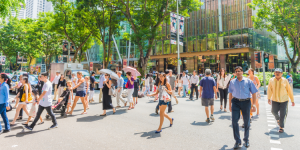
With the housing crisis, energy crunch, increasing air and rail fares, and escalating prices for essential goods, it's time for expatriates and regular travelers to find ways to save money. How do you intend to manage your expenses as an expatriate in 2024?
High inflation and modest growth
Finally, after reaching its peak in 2022 (with a 9.5% increase in the OECD, 9.1% in the UK, 6.9% in South Africa, 6.8% in Canada, etc.), global inflation is set to decline in 2023. The slowdown will continue in 2024, with a projected 5.2% for OECD countries. However, inflation continues to weigh on economies. The OECD anticipates a mixed 2024, characterized by "modest growth." Estimated at 2.9% this year, it is expected to dip to 2.7% before bouncing back to 3% in 2025. Despite this, there are significant disparities among states, and these seem to be intensifying.
Asia, led by India, Indonesia and China, is pivotal in supporting global growth. The OECD predicts substantial GDP growth for these countries at 6.1%, 5.2%, and 4.7%, respectively. In contrast, growth forecasts are considerably more restrained in the USA (1.5%), New Zealand (1.4%), and France (0.8%). Despite controlled but persistent inflation, modest global growth, and the widening disparities among states, there are real consequences for expatriates' living costs.
Rising cost of living: the example of Senegal
With growth estimated at 4.1% in 2023, according to the IMF, Senegal maintains its position in the middle tier of African economies. Inflation has decreased to 6.5% and is expected to drop further to 3% by 2024. Despite this, the figures remain relatively high for both locals and expatriates in Senegal. In 2022, Dakar claimed the title of the most expensive city in West Africa, leading to a significant increase in the cost of living, especially in terms of housing, for many expatriate students.
Housing crisis
These students mainly come from Cameroon, Benin, Gabon and Togo, where housing is more affordable. Testifying for the BBC, a student from Cameroon says she pays 150,000 FCFA a month (around 250 USD) for her studio in Dakar. According to her, the same studio would only cost 50,000 or 60,000 FCFA (around 83 to 100 USD) per month in Douala or Yaoundé, cities in Cameroon. A view shared by many other expatriates, as well as locals in Dakar.
Despite the 2014 law aimed at regulating rental prices to support modest incomes, the issue remains. The law introduces automatic reductions based on rent amounts: a 4% reduction for rents exceeding 500,000 FCFA, a 29% reduction for those below 150,000 FCFA, and a 14% reduction for rents between 150,000 FCFA and 500,000 FCFA. However, residents are still waiting to witness the tangible effects of this measure. The law, poorly enforced, has not led to the expected changes, even with a new intervention by the State in February 2023. Landlords are voluntarily increasing rents and refusing to rent to modest locals and expatriates, instead preferring deals with wealthy foreigners. According to their explanations, this decision is made under duress, as they cite inflation and the rising costs of raw materials and energy, forcing them to raise rents.
Rising food prices
Laws governing price controls have been passed in various sectors, including electricity and food items. However, they are only sometimes applied. On October 20, frustrated residents in Dakar took to the streets to protest the increasing cost of living. They criticized a 2014 law that, in their view, lacks provisions for monitoring or controlling landlords. Similar concerns extend to food prices, where the cost of a kilo of onions, for example, surged from 500 FCFA in 2021 to 1300 FCFA. Other food items are also subject to alarming price rises.
Electricity bills are also rising, doubling without any increase in consumption. Nevertheless, in 2022, Senegal implemented subsidies in the energy sector to manage costs, with 750 billion FCFA in subsidies in 2022 and approximately 556 billion in 2023. In return, it is reported that the national electricity company (SENELEC) has increased its tariffs, doubling or even tripling them. Despite complaints from both locals and expatriates, SENELEC contends that there hasn't been a recent significant rise in price but rather attributes it to a "new tariff grid."
Countries with the highest cost of living
Where will you find affordable living as an expatriate in 2024? Worldwide Cost of Living 2023 – the latest biannual study by The Economist Intelligence Unit (EIU), the research and analysis division of The Economist Group – highlights the countries with the highest cost of living. Singapore claims the top spot as the most expensive city in 2023 among 173 surveyed countries. Zurich follows in 2nd place, with Geneva in 3rd, and the list continues with New York, Hong Kong, Los Angeles, Paris, Copenhagen, Tel Aviv, and San Francisco (10th). According to the study, prices in countries with high living costs increased by approximately 7.4% in local currency. Conversely, they saw significant declines of up to -321% in local currency in the least expensive cities, including Buenos Aires, Chennai, Ahmedabad (India), Lagos, and Tunis. The EIU notes that these figures account for national devaluation policies, emphasizing that fiscal policy and economic conditions directly influence price levels.
Although the study acknowledges a slowdown in the increase of prices, it remains cautious. The slowdown is observed only at the fringes and doesn't concern all sectors. While water and electricity bills are decreasing, transport costs are on the rise, and food prices are experiencing significant increases. The geopolitical context, such as Russia's invasion of Ukraine, and the environmental context, including natural disasters, amplify these price hikes. The study highlights the numerous variations both between and within countries.
Cost of living: How to make the most out of your expat life in 2024?
Can expatriation be a savvy move? Above all, it's crucial to emphasize the significance of relocating to a country that genuinely interests you—whether it's for cultural appreciation, a desire for exploration, or the presence of a local network. Making a decision based solely on the cost of living may not be the wisest approach. It's essential to also consider factors such as the political and socio-economic climate, job opportunities, housing availability, and more. Are immigration procedures complex? Do certain professions benefit from simplified processes? Is the city easily accessible? Once you have carefully considered these factors, a few small steps can help reduce the expenses.
Selecting the ideal neighborhood and accommodation is crucial; rents can vary by as much as double, depending on the location. Good research will help you find the best value for your money.
Eat locally and in season: Instead of purchasing costly imported goods, consuming locally sourced products is more economical.
Consider the bigger picture: Searching for the most affordable apartment two hours away from your workplace might not be the best solution, especially if transportation expenses are high. It's wiser to select a location based on proximity to your workplace, your lifestyle, and essential services like schools for your children.




















Comments